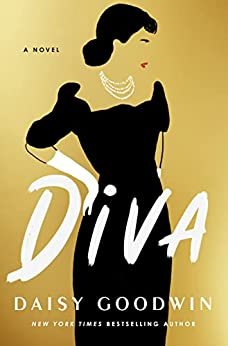What a magnificent, intense and detailed novel! DIVA was obviously well researched to create such a believable picture of the world famous opera singer, Maria Callas. I found this story riveting from start to finish and struggled to put it down. I even read it while eating! The content within these pages certainly stirred up my thoughts. Daisy Goodwin really gets inside the mind and heart of this very gifted woman. We dive into the belly of the whale and experience Maria’s many conflicts, stresses, heartbreaks and passion. DIVA shows us who Maria Callas might have been: both the woman and the opera singer.
Maria’s devotion and love for Aristotle Onassis made my heart break as he was not only a man of position and power but these things ruled his every move. Money and status were very important to him and, although he said he loved Maria, his decisions in the end proved what came first in his life. She says of Onassis: that ‘he had all the outward signs of civilization…but…Underneath there was something that did not belong in the world of silk socks.’
But how did this man affect her focus? When asked the secret of her success earlier in the novel: she said, ‘hard work…high standards…’ and ‘I don’t let anything obstruct my pursuit of excellence.’ When Onassis hears her say this, he states she sounds like a general. She replies: ‘Great art is domination. It’s making people believe for that precise moment in time there is only one way, one voice. Mine.’ A strong and powerful viewpoint. But did that change when Onassis entered her life?
Single devotion was important to Maria. Onassis was not a one-woman man. So, he was bound to break her heart. Initially her husband seemed to be a great source of support. But was he truly? Or did he have hidden motives, too, to manipulate her and steal her hard-earned wealth? We cannot help but feel, he took advantage of her, too. Why was she at the mercy of such men? You have to wonder if her extreme dependence on them for love and emotional support was a result of her bad relationship with her mother. Maria was often driven by the need for acceptance. This may have been fuelled by her mother’s behaviour toward her as a child—which included making her feel self-conscious. Maria was the black sheep of the two daughters. Until her mother discovered her rare vocal talent, then she became a pawn in her mother’s hands and was exploited. Maria never knew a mother’s caring love. So, she was always seeking it elsewhere.
Sadly, this scenario is seen far too often in child prodigies: parents seeking money and position through their gifted children. Often these children will say when older, they missed their childhood as they were pushed into becoming wage earners at such young ages. Taking on the burden of supporting a family causes emotionally trauma. Striving for perfection also takes its toll. This hiring out of children could be thought of as a form of child labour/slavery. A centuries old problem that rears its ugly head over and over in many different ways, ages and scenes. Children in modern developed countries may not be slaving away in factories today (except in poorer parts of the world and where armed conflicts exists) but their task masters are none less brutal. The damage can cause insecurity, the need to always seek approval and acceptance and we see this in Maria. She comes to loathe her mother and never gets to have a healthy relationship with her or anyone, really.
This novel contains a very perceptive character study of a woman that caught the world’s attention and held it to the very end. The author has given us a magnificent portrayal of what Maria’s life may have been like and although her talent took her to dizzying heights of stardom, it also led her to the depths of despair. And there is one occasion when she is teetering on the edge. The up side of all this is she channelled her grief, passion, disappointment and ecstasy into her performances which allowed her to reach beyond her own (sometimes self-imposed) limitations. But she was a DIVA in every sense of the word—including exhibiting temperamental characteristics. She cancelled performances for various reasons creating lots of havoc. But when she performed, the world was at her feet and many forgot her seemingly uncaring concern for her fans. That sort of rebellion, too, may be linked to her mother. She had bent her will so often as a younger person under her mother’s care, that once she got away from her direct control, she fought against or would not let anyone put her in such a precarious position again. Yet, ironically the very thing she tried not to do, she did. Regardless, she was able to embody the tragic characters in music she played. Although approached to consider acting, she never followed that path. She only wanted to sing.
There is so much to say about this novel and Maria Callas. There are some great supporting characters and various historical important figures like Winston Churchill and Princess Grace of Monaco, just to name a couple. Maria travelled in some high flying circles—that increased with Onassis. But at the end of the day, this is a story about Maria and the ruthless and sometimes dazzling world she lived in. Sometimes dressed in Dior-inspired clothes, adorned with extravagant jewels to wear, known by a friend as ‘devious diva’ but always to the world as la divina: the divine one. DIVA is an intriguing journey from the point when Maria discovers her talent, how it made her feel and how she looked at everything through the lens of her gift—which became her comfort and security. A brilliant novel I highly recommend. 5 Stars ⭐️⭐️⭐️⭐️⭐️
Thanks to Aria & Aries and Netgalley for the advanced reading copy.
